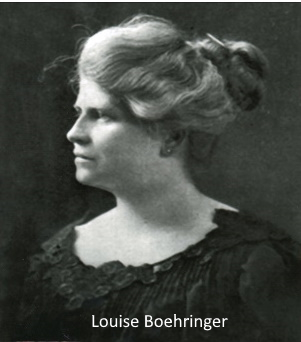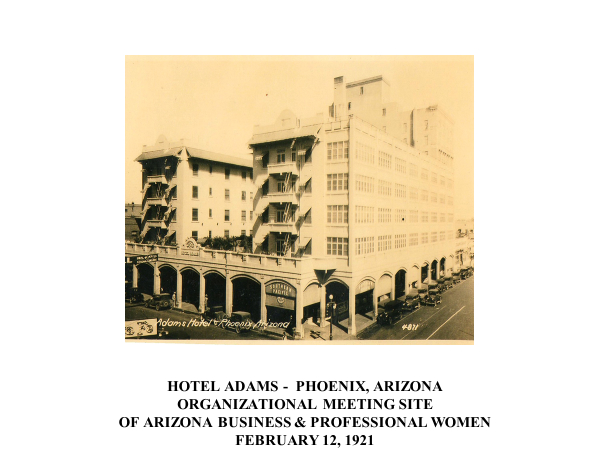



Working women in communities throughout the Arizona Territory had organized into groups early in the twentieth century but were not connected to each other. A national movement to federate the various women's groups began in 1918, primarily as an effort to organize support for World War I. While the war ended in 1918, the idea for a national group went forward, resulting in the formation of the National Federation of Business and Professional Women's Clubs, Inc. in 1919. Several Arizona women, including C. Louise Boehringer of Yuma (BPW/AZ first president), attended the historic meetings in St. Louis, Mo. in July 1919. Working women in Arizona met in Phoenix, February 1921, and in one day they decided to become a state organization with affiliation at the national level, wrote bylaws, developed a constitution, and elected officers. Tens of thousands of women have belonged to BPW/AZ since its founding in February 1921. Thousands of women have served as officers and committee chairmen. Thousands of projects have been completed and tens of thousands of dollars have assisted young women with their educations and careers.
Nogales, Douglas, Tucson, Yuma, Phoenix and Prescott were the six original clubs of BPW/AZ; of those, only Phoenix remains. Other early clubs were formed in Jerome, Globe, Pinetop, Flagstaff, Kingman, Williams, and Clarkdale, none of which exist today.
Pioneer BPW/AZ women homesteaded near Flagstaff, ranched in the White Mountains, piloted a riverboat on the Colorado River, lived in a tent in the Old Pueblo, and taught school in Yuma. They were attorneys, secretaries, postmistresses, business owners, politicians, opticians, and physicians.
Arizona in the early 1900s was a vast territory, emerging as a state, with a small population. When women did organize and meet, they made the news. Old newspaper clippings, the Arizona Historical Society and the Arizona State Library contain records of their exploits. Their deeds left markers down through the history of Arizona. These women belonged to nearly every group in town, in fact, founded and provided the leadership for many of them. They brought art, culture, and education to the raw territory. They created social gatherings and stimulated moral discussion. Business and Professional Women practice good citizenship, encouraged public good works, and ran for elected office. They rallied communities through wars and depression times and always aided those in need.

Women Who Made a Difference has been published by the Arizona Business and Professional Women's Foundation to record and preserve the history of Arizona's working women.
This commemorative series of books was published to honor women of Arizona BPW and their contributions to culture and public service in their communities and the state of Arizona. Some women were legislators, teachers, doctors, county school superintendents, lawyers, city council members, chamber of commerce secretaries, and justices of the peace. Other women founded historical societies, owned newspapers, managed post offices, ranched, farmed, and operated lumber mills. In 1950 one woman even ran for state governor!
Together, these women business leaders helped create political and social changes that shaped modern Arizona.
Volume I covers the years 1921 - 1968 and is out of stock. Volume II includes many capsules of history while recording the lives of outstanding women who were members of BPW and also important in Arizona between 1921 and 1988. This volume includes 95 biographies of the founders of many Arizona communities. The vision of these amazing women helped make this a great state. Volume II is available for sale. Highlights of some of biographies in Volume II:
Polly Rosenbaum - She's been described in many ways: "a miniature rock of Gibraltar," "a living repository of Arizona history," and, "the First Lady of Arizona." In 1949, Polly Rosenbaum began her long and illustrious career in the Arizona Legislature.
Grace Marian Sparkes - Nicknamed "Babe," Grace was an active worker in Prescott, pioneering such project as the Yavapai-Prescott Indian Tribe reservation, the Arizona Pioneer's Home, the bridge and direct route to California, now known as I-10, the Veterans Hospital at Old Fort Whipple, and the Smoki Museum.
Volume III is twice the size of the other volumes and is printed on archival paper. It includes 300 biographies of more current Arizona women of historical importance. Volume III is available for sale. Highlights of some biographies:
Theodora Sprecker Marsh - was the first Arizona woman legislator from Santa Cruz County and longtime member of the Arizona Board of Regent. When she ran for state legislature in 1917, her candidacy as a woman raised controversy, but she was admired as an able businesswoman and good citizen.
Jessie Gray Bevan - Teacher, boardinghouse owner and legislator. Jessie overcame deep personal tragedy. She entered politics in Bisbee and improved working conditions for Arizona's miners.
Published in 1998 and 2003, Vols. 2 and 3 of Women Who Made A Difference received positive reviews from newspapers throughout the state:
"It is perhaps one of the most interesting historical volumes ever published in Arizona" - Paul Sweizter, Arizona Daily Sun
"Fascinating reading" - J.C. Martin, Tucson Daily Citizen
Women Who Made A Difference, Volume 2 was also selected by J.C. Martin for the top 1998 Southern Arizona Authors book list.
If you would like a complete list of the Women Who Made A Difference, you can download the PDF files for each book from the links here.
Click here for Book II (PDF file)
Click here Book III (PDF file)
The money raised by selling these editions of Women Who Made a Difference goes toward scholarships for women who want to make a difference. The first copy of either book is $25. Any two books will cost $40, and each additional copy is $10. Shipping is $5 per book. To order one or both of these remarkable historical books. Click Here to Order using credit card
Or you can order by check. Just download, print and fill out this order form (Click Here to order by check) and mail it along with your check directly to: Arizona BPW Foundation, P.O. 32596, Phoenix, AZ 85064.